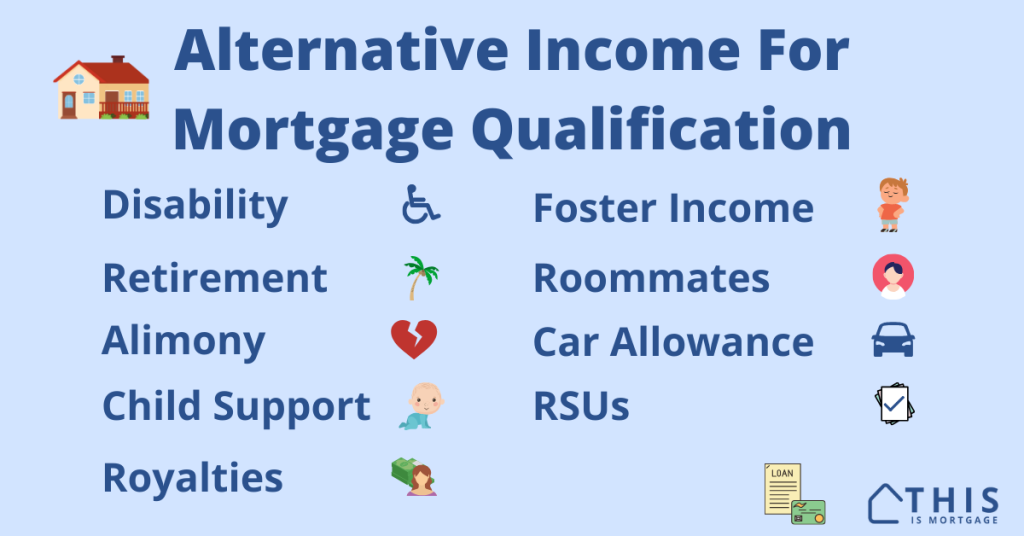There are almost too many income types to name, but you might be surprised that you can use many of them to qualify for a mortgage.
Following are less-common but important types of income and how to leverage them to qualify for an FHA, conventional, VA, and USDA mortgage.
See if your income type qualifies you for a mortgage.
Disability
Disability income from the Social Security Administration, VA, or a private disability plan may be used to qualify for the loan.
The disability must be expected to continue for three years. Lenders will review the award letter. If it does not define an expiration date, the lender will consider it likely to continue.
The lender must not require you to provide a medical re-evaluation or inquire about the nature of the disability.
Documentation
You will document disability payments with one or more of the following:
- Award letter
- Tax returns
- Most recent bank statement showing receipt of the disability payment from the provider
- Form SSA-1099 for Social Security disability
If the disability income is tax-free, the lender may gross up the income amount, typically 15-25% depending on the loan program.
See if disability income can help you buy a home.
Retirement income
Regular retirement income that is expected to last three years may be used to qualify such as:
- Social Security retirement income
- Pensions
- 401ks and retirement savings
- Annuities
If retirement assets are used for down payment, the lender will reduce expected income based on the amount withdrawn.
Documentation
- Award or benefits letter for SSA retirement
- Retirement letter for the pension
- Most recent bank statement showing income is being received
- Tax returns
The lender will average two years of 401k income for qualification purposes. If you are depleting the asset to qualify, the lender will verify adequate funds for at least three years. It may not approve a loan that only has three years’ worth of assets.
Alimony, child support, separate maintenance
Support payments from an ex-spouse may be used as qualifying income. You never have to disclose this income, but you can voluntarily add it to your application.
You must prove the support will continue for three years. In the case of child support, for instance, submit proof of the child’s age. Support for children over 15 can’t be used since it won’t continue for more than three years.
Another unfortunate fact is that many ex-spouses make sporadic or partial payments, or don’t make payments at all.
For this reason, lenders need to document receipt of payments, not just that you are legally entitled to them.
Documentation
- Divorce decree or separation agreement
- Voluntary payment agreement and 12 months of canceled checks or tax returns proving receipt. Payments must be made for the most recent six months
- Proof of receipt of payment for the most recent three months for court-ordered payments
If payments have been sporadic, the lender can use the average amount received over the past two years or the full amount of time support has been received.
However, if you just started receiving payments, or have not yet received any payments due to a recent divorce, you may not be able to use the income to qualify.
Also keep in mind that the above are general guidelines, and requirements might vary based on the lender and loan type.
Get help analyzing your income.
Foster income
A two-year history of foster care income is required to use it for mortgage qualification.
The lender will use the lower of a two-year average, or most recent year if it’s lower.
For instance, you average $1,500 per month over the past two years, but you’ve averaged just $1,000 over the past 12 months. The lender will use $1,000 per month.
Documentation
- Verification from the foster agency or government organization showing two years of foster care history and receiving payment
- Bank statements or government document showing income received for the past two years
- The lender may request a letter of good standing from the agency or organization to prove that the income is likely to continue
See if your foster income qualifies you for a mortgage.
Roommate/boarder income
In rare cases, you can use income from a roommate to qualify for the new home. In all cases, you can’t simply find a roommate. That roommate/boarder must have a history of living with you and intends to live in the new home.
Following are guidelines based on loan type.
Documentation
- FHA
- Document a two-year history of receiving the income on tax returns.
- Provide a signed agreement on the boarder’s intent to live in the new home and rent amount
- Fannie Mae/Freddie Mac conventional loans
- Document the person has been a roommate for 12 months
- Bank statement showing at least 9 rent payments received over the last 12 months
- Roommate’s driver’s license or other document showing that their address is the same as your current address
- Boarder income can be no more than 30% of qualifying income
- VA
- Boarder income can only be used to offset the payment on a property the veteran is departing. You may not use future rental income from a boarder to qualify for a single-family residence.
- USDA
- Roommate/boarder income is ineligible for qualifying purposes
Automobile allowance
Generally, the lender must verify the automobile allowance receipt over the previous two years, the average of which will be used.
If using a car allowance to qualify, the lender will include the lease or loan payment into your debt-to-income ratios.
Restricted stock units (RSUs)
One-time awards are not considered ongoing and can’t be used for qualifying income.
However, RSU units received regularly may be used to qualify for conventional loans.
You need at least 12 months of RSU income from the same employer for time-based awards.
For performance-based awards, you need 24 months of history, but at least 12 months plus:
- Future vesting in similar amounts that will continue for 24 months
- 5 years of RSU income from any previous employer
The stock must be publicly traded.
Income calculation will be based on the 200-day moving average share price times vested shares awarded over the past 24 months.
For example, you’ve received 100 shares over the past two years. The 200-day moving average of the stock is $300. Your qualifying monthly income would be 100 X $300 / 24 = $1,250 per month.
FHA guidelines do not mention RSUs specifically but do address capital gains. For FHA loans, you may need to sell stock granted as RSUs on an ongoing basis to generate an income average, but check with your lender.
Documentation
- Current vesting schedule
- Brokerage account statement
- Verification of employment showing RSU history
- Two years’ W2s
Royalty income
Royalty income can be used to qualify. You must have received the income for the past two years and claimed it on tax returns.
Royalty income must be expected to continue for three years.
Documentation
- Two years’ tax returns
- Royalty contract or statement confirming the amount, frequency, and duration of the income
Many types of income can help you buy a home
There are dozens of types of income you can use to qualify for a home if you have a history of receiving it and it’s likely to continue.
Apply with a lender to get a personalized income analysis.




